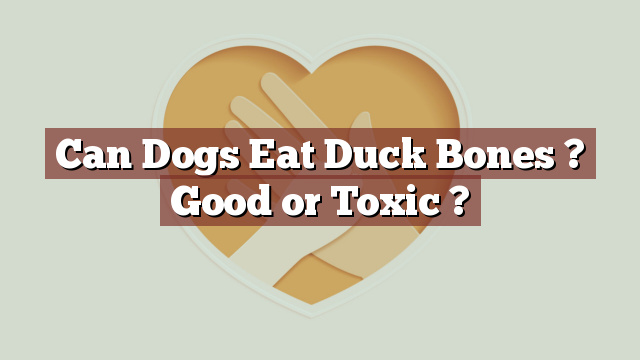Can Dogs Eat Duck Bones? Good or Toxic?
Knowing which foods are safe for our pets is essential for their overall health and well-being. One food that often raises questions among dog owners is duck bones. Are they safe for dogs to consume, or are they potentially toxic? In this article, we will explore the nutritional value of duck bones, discuss their safety for dogs, highlight potential risks or benefits, and provide guidance on what to do if your dog happens to eat duck bones.
Nutritional Value of Duck Bones
Duck bones contain essential minerals such as calcium and phosphorus, which are vital for maintaining healthy bones and teeth in dogs. These bones also provide a good source of protein, which is an important component of a canine’s diet. Additionally, duck bones may contain small amounts of other nutrients like iron and vitamin B12.
Are Duck Bones Safe or Toxic for Dogs?
No, dogs should not eat duck bones. Although they may have some nutritional value, the potential risks outweigh any benefits. Duck bones, like any other poultry bones, can splinter and cause serious harm to a dog’s digestive system. These splinters can lead to choking, internal injuries, or even blockages in the intestines. Furthermore, these bones can be sharp and cause damage to the mouth, throat, or stomach lining.
Veterinary experts strongly advise against feeding dogs any type of poultry bones, including duck bones. The risk of harm far outweighs the potential nutritional benefits.
Potential Risks or Benefits of Dogs Eating Duck Bones
While duck bones offer some nutritional value, the risks associated with feeding them to dogs outweigh any potential benefits. The splintering nature of these bones can cause severe injuries to the digestive tract, leading to emergency veterinary care. In some cases, surgery may be required to remove bone fragments or to repair damage caused by ingestion.
It is important to note that the risks associated with poultry bones apply to both cooked and raw bones. Cooking the bones does not make them safe for consumption; in fact, cooked bones are even more likely to splinter.
What to Do if Your Dog Eats Duck Bones
If you suspect that your dog has consumed duck bones, it is crucial to take immediate action. Do not induce vomiting, as this may cause further injury if the bones have already caused damage. Instead, contact your veterinarian right away for guidance. They will be able to assess the situation and provide appropriate advice based on your dog’s individual circumstances.
Conclusion: Dogs Should Avoid Eating Duck Bones
In conclusion, it is best to keep duck bones away from your furry friends. While they may contain some nutritional value, the potential risks of ingestion far outweigh any benefits. Duck bones can splinter and cause serious harm to a dog’s digestive system, leading to choking, internal injuries, or blockages. If your dog accidentally consumes duck bones, it is important to consult with a veterinarian immediately. Remember, the health and safety of our canine companions should always be our top priority.
Thank you for investing your time in exploring [page_title] on Can-Eat.org. Our goal is to provide readers like you with thorough and reliable information about various dietary topics. Each article, including [page_title], stems from diligent research and a passion for understanding the nuances of our food choices. We believe that knowledge is a vital step towards making informed and healthy decisions. However, while "[page_title]" sheds light on its specific topic, it's crucial to remember that everyone's body reacts differently to foods and dietary changes. What might be beneficial for one person could have different effects on another. Before you consider integrating suggestions or insights from "[page_title]" into your diet, it's always wise to consult with a nutritionist or healthcare professional. Their specialized knowledge ensures that you're making choices best suited to your individual health needs. As you navigate [page_title], be mindful of potential allergies, intolerances, or unique dietary requirements you may have. No singular article can capture the vast diversity of human health, and individualized guidance is invaluable. The content provided in [page_title] serves as a general guide. It is not, by any means, a substitute for personalized medical or nutritional advice. Your health should always be the top priority, and professional guidance is the best path forward. In your journey towards a balanced and nutritious lifestyle, we hope that [page_title] serves as a helpful stepping stone. Remember, informed decisions lead to healthier outcomes. Thank you for trusting Can-Eat.org. Continue exploring, learning, and prioritizing your health. Cheers to a well-informed and healthier future!

